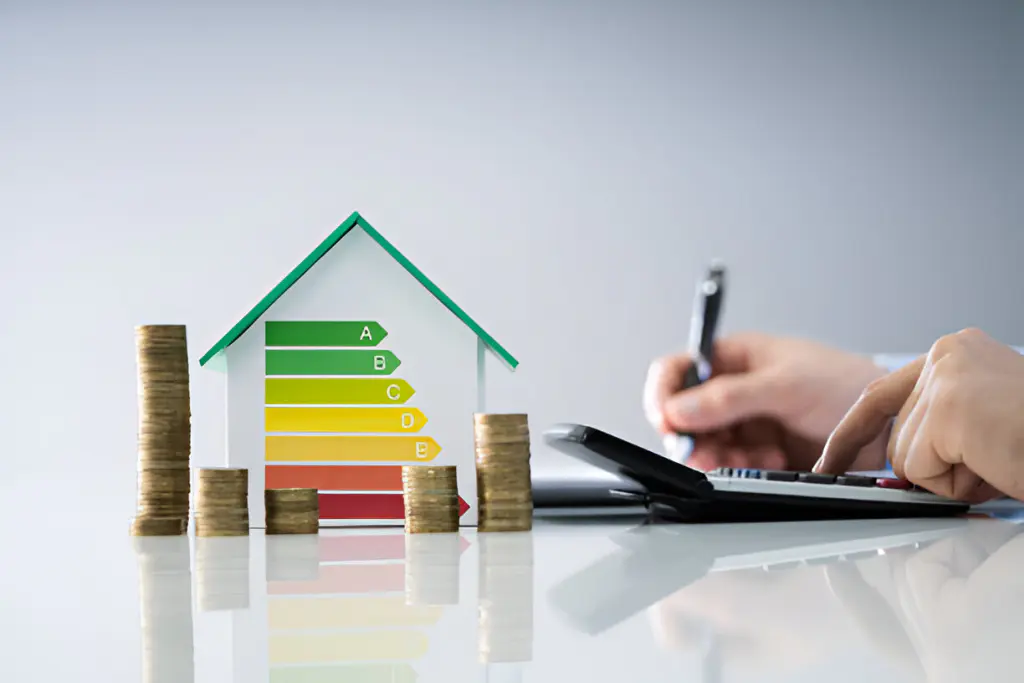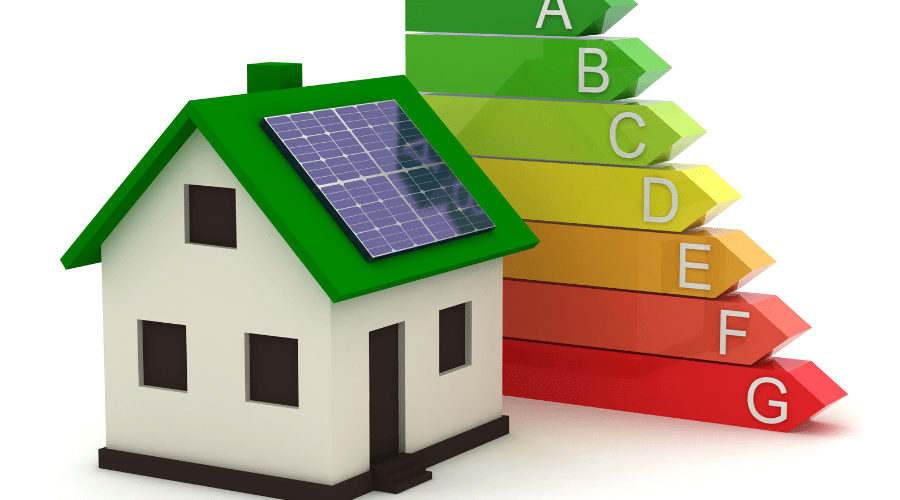The Energy Performance Certificate (EPC) serves as a critical metric in assessing the energy efficiency of properties, categorizing them on a scale from A, denoting high efficiency, to G, indicating poor performance. This classification not only guides potential buyers and tenants in making informed decisions but also flags areas where energy use can be optimized, thereby reducing environmental impact and operational costs. As regulations tighten and societal focus shifts toward sustainability, understanding the implications of your property’s EPC rating becomes crucial. How, then, might owners and investors navigate this landscape to enhance their property’s energy profile and, by extension, its market value? Let’s understand What Is an EPC Rating and Why Is It Important.
Understanding EPC Ratings
An Energy Performance Certificate (EPC) rating is a crucial measure of a property’s energy efficiency, graded on a scale from A to G, with A representing the most efficient and G the least. Understanding these ratings involves scrutinizing various EPC rating factors that determine the energy performance of residential and commercial buildings.

Crucial among these factors are the building’s insulation quality, heating systems, and the incorporation of advanced energy efficiency technologies.
For property owners, the responsibilities extend beyond mere compliance; they must actively engage in optimizing their properties through technologies such as solar panels, high-efficiency boilers, and smart energy management systems.
These enhancements not only improve the EPC rating but also offer significant environmental benefits by reducing the property’s carbon footprint.
Moreover, current property market trends increasingly favor energy-efficient homes, reflecting a growing consumer awareness of sustainability issues.
Properties with higher EPC ratings typically attract higher market values and quicker sales, incentivizing homeowners to invest in energy efficiency upgrades.
Therefore, understanding the intricacies of EPC ratings allows homeowners to make informed decisions that align with environmental objectives while capitalizing on the economic benefits of the competitive property market.
Significance of EPC Ratings
Understanding the significance of EPC ratings is essential for anyone involved in property management, development, or ownership. These ratings not only reflect a property’s energy efficiency but also guide strategic decisions in a market increasingly attuned to sustainability.
Higher EPC ratings often correlate with reduced operational costs due to lower energy consumption, presenting significant EPC rating benefits. As environmental regulations tighten, properties with superior EPC ratings align more closely with compliance, thus minimizing legal risks and potential fines.
In the context of mortgage requirements, financial institutions are progressively acknowledging the value of energy-efficient homes. This shift in the property market is prompted by both consumer demand for greener living spaces and the potential for longer-term financial savings.
Consequently, properties with better EPC ratings are more likely to meet stringent lending criteria, offering an advantage in securing financing.
Moreover, staying abreast of energy efficiency trends is crucial. As technologies evolve and new standards emerge, EPC ratings will play an increasingly pivotal role in shaping the property landscape.
This adaptability to market shifts ensures that stakeholders not only meet current benchmarks but are also well-positioned for future developments in property valuation and marketability.
Impact on Property Values
EPC ratings significantly influence property values, serving as a critical indicator of a building’s energy efficiency. A high EPC rating not only suggests lower future energy costs but also enhances the property’s desirability among eco-conscious buyers. This, in turn, can elevate the property’s market value.

Properties with superior EPC ratings often attract a premium, reflecting the growing buyer preference for energy-efficient living spaces. These homes typically sell faster and at higher prices compared to properties with lower ratings.
Moreover, as market trends increasingly favor energy-efficient homes, properties with better EPC ratings exhibit stronger investment potential. This trend is fueled by heightened awareness of environmental issues and the economic benefits of reduced energy consumption.
Real estate investors are particularly attuned to these shifts, recognizing that energy-efficient properties are likely to appreciate more significantly over time.
Furthermore, regulatory changes and potential future legislation that could mandate higher energy standards make investing in properties with good EPC ratings a prudent strategy.
Strategies for Improvement
Improving a property’s EPC rating is a strategic move that can enhance its market value, reduce energy costs, and increase its appeal to environmentally conscious buyers.
One of the most cost-effective improvements is upgrading insulation. Enhancing loft, wall, and floor insulation can significantly reduce heat loss, making the property more energy-efficient and comfortable.
Updating the heating system is another pivotal strategy. Replacing outdated boilers with high-efficiency models or considering renewable technologies like heat pumps can drastically lower energy consumption and carbon emissions.
Additionally, incorporating energy-efficient appliances is a practical approach to boost the EPC rating. Appliances such as refrigerators, washing machines, and dishwashers that have a high energy efficiency rating consume less electricity and operate more economically.
The integration of renewable technologies, such as solar panels or biomass heating systems, also plays a crucial role. These systems not only decrease reliance on non-renewable energy sources but may also provide long-term savings and add significant value to the property.
EPC Rating Ranges
Building on the strategies for enhancing a property’s energy performance, it is important to understand the specific EPC rating ranges, which categorize properties from A to G.
These ratings are a pivotal aspect of EPC rating history, reflecting the evolution of energy efficiency standards globally. An A-rated property signifies the highest level of energy efficiency, incorporating cutting-edge energy efficiency technologies and often resulting in lower energy costs and a reduced environmental footprint.
Conversely, a G-rated property indicates poor energy performance, typically due to older, inefficient systems and a lack of modern insulation or heating solutions.
These ranges are not just theoretical labels but play a critical role in property market trends, influencing buyer decisions and property values. Real estate markets increasingly favor higher-rated properties due to their cost-effectiveness and lower carbon emissions.
Furthermore, global EPC standards are harmonizing, pushing for broader adoption of higher efficiency measures. Tools like EPC rating calculators help property owners and potential buyers estimate and compare energy performance, ensuring informed decision-making.
Understanding these ranges helps stakeholders navigate the complexities of real estate transactions, renovations, and compliance with environmental regulations, reinforcing the importance of energy performance in modern property markets.
Renewal and Validity
An essential component of maintaining an energy-efficient property is the regular renewal of its Energy Performance Certificate (EPC), which remains valid for a decade. This periodic reassessment ensures that any improvements or deteriorations in energy performance are accurately reflected, potentially affecting the property’s market value and compliance with environmental standards.
To understand the importance of timely EPC rating renewal, consider the following:
- Energy Efficiency Assessment: Renewing the EPC provides an updated evaluation of the property’s energy usage and efficiency. This assessment identifies areas where energy performance can be enhanced through insulation improvement strategies or more efficient energy systems.
- CO2 Emissions Measurement: The renewal process includes a detailed measurement of the property’s carbon emissions. Reducing CO2 emissions is vital for meeting environmental targets and can be influenced by adopting the recommended improvement measures in the EPC report.
- Property Valuation Impact: An up-to-date EPC can significantly influence the valuation of a property. Prospective buyers and tenants are increasingly aware of the operational costs associated with energy inefficiencies, making a high EPC rating a desirable attribute that can boost property appeal and value.
Addressing these aspects during the EPC renewal can guide property owners in implementing effective energy-saving measures, ensuring their property remains competitive and compliant with evolving energy standards.
Financial and Legal Implications
Regarding the financial and legal implications of EPC ratings, it is crucial to recognize the direct impact these ratings have on both the marketability and compliance of properties. A higher EPC rating not only enhances a property’s appeal to potential buyers and tenants but also aligns with escalating market trends favoring energy-efficient living spaces. This alignment bolsters property investments, as properties with superior ratings typically command higher prices and are quicker to sell or rent.
From a legal compliance perspective, properties must meet specific EPC thresholds to qualify for certain funding eligibility schemes, such as the Boiler Upgrade Scheme, which can significantly offset costs associated with energy improvements. Failure to comply with these standards can result in restricted rental capabilities, especially in regions mandating minimum EPC ratings for tenanted properties. This legal framework ensures that property owners are incentivized—or, in some cases, compelled—to invest in energy efficiency upgrades.
Moreover, the potential energy savings from higher EPC ratings can be substantial, reducing long-term operating costs and enhancing the financial viability of retaining or investing in property. As regulations tighten and energy costs climb, the importance of an optimized EPC rating becomes increasingly pronounced, influencing both current property valuations and future marketability.
Conclusion
In conclusion, Energy Performance Certificates (EPCs) are crucial for assessing a property’s energy efficiency, significantly influencing marketability, property values, and compliance with environmental regulations. Higher EPC ratings not only attract potential buyers but also offer financial advantages through reduced operational costs and favorable mortgage conditions. As environmental concerns gain prominence, understanding and enhancing EPC ratings become imperative for property owners aiming to optimize market positioning and ensure regulatory compliance.









